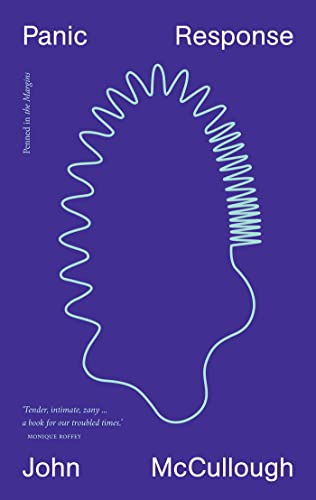REVIEW: JOHN MCCULLOUGH’S ‘PANIC RESPONSE’
By Stella Backhouse

John McCullough’s 2022 collection Panic Response is a delicate and moving evocation of grief, mental breakdown and eventual re-emergence. Although primarily a frank and deeply personal memoir, recent lockdown events and the ever-present drumbeat of climate and environmental crisis lend a wider relevance to these poems. In telling his own story, McCullough also captures the invisible mental toll exacted on all of us by the anxiety, powerlessness, isolation and looming sense of catastrophe that have become increasingly difficult to ignore.
At the heart of Panic Response is a shattering bereavement, plainly elucidated in ‘Flower of Sulphur’. After his friend died, McCullough was “Unable to write one PhD chapter, I had a/breakdown, moved back in with my parents”. As well as a brave portrayal of the landscape of inner turmoil, the collection also asks questions about how we accommodate bereavement and how we continue to be ourselves in the face of it. When McCullough opens ‘Flower of Sulphur’ with the line “I love poetry but I love my friends more”, he is perhaps articulating the anxious push/pull tension between fear of forgetting and urge to move forward. It’s evident again when he beats himself up for mourning too much. Linking to the earlier poem ‘Error Garden’ in which he likens grief to a maze, he says that “Laelius calls the prolonged mourning of a friend an/error. For a man to be grevously troubled for his owne/losses, it is selfly love, and not frendly love”.
In fact, throughout the collection this tension plays out in a number of ways. Thematically, there is the contrast between the life McCullough has created for himself in Brighton and the more limiting environment in his hometown of Watford. Poetically, the deliberate, sometimes slightly disjointed consciousness of someone who appears to be expending effort on keeping their brain under careful control contrasts with the exhilarating but mentally exhausting experience of free-flowing thought. In ‘Glass Men’ the poet seems to walking on stepping-stones, rigorously testing the safety of each idea before moving to the next. Meanwhile, in the poem whose title is a comma, breathless punctuation is used to convey spiralling out-of-control thought processes – but now the spiralling, because a known quantity, has become a kind of security: “I’d do/anything not to be castled with my thoughts, could bear/only the shortest intermissions”.
In the end, various exits from this mental treadmill present themselves. Back in Brighton, McCullough is inspired by the poet Lee Harwood and the pioneering gay rights campaigner Edward Carpenter, both of whom had links to the town. In ‘Candyman’, temporary respite is offered by remembering that the self is plural. Although elsewhere McCullough observes that “It’s tough to stay vaporous/when each day, you present windows on my life”, here there is realisation that there’s no shame in being a work in progress: “I am almost convinces me more than I am”. In ‘Bungaroosh’ and ‘Mr Jelly’ the theme is developed further by awareness that it’s also acceptable to have blurred edges: “You can exist in an unsettled structure/and wear any precarious face you have” (‘Bunagaroosh’); “Mr Jelly is my favourite Mr Man – fuchsia skin, wavy body./One website lists his traits as Wobbly, Uneven, Unbalanced,/Inconsistent” (‘Mr Jelly’).
Panic Response is a collection rich in symbolism. Colours, weather and volcanic eruptions are all important repeated motifs, but the idea of air – and by extension, breathing – is particularly important. In the early poems, hyperventilation is synonymous with panic and with constantly recycling the same thoughts, but as the collection nears its end, a new appreciation of air signals escape and healing: “I drank/in a crisp lungful of freshness so unexpected I was taken out/of myself and far into the sky” (‘Six’).
McCullough’s most important source of support is of course his partner, and the final poem ‘Crown Shyness’ brings together many of the collection’s themes in a celebration of their love. McCullough’s mental health is still subject to occasional reversals, but he feels at one with the travelling wind, his shared life is symbolised by shared breathing and his untroubled walks to the edge of the park with Morgan suggest – I hope – an equalisation of pressure between old and new lives and an equanimity about what lies beyond.
Panic Response is available to purchase online, direct from publisher Penned in the Margin, as well as other bookshops and retailers.
